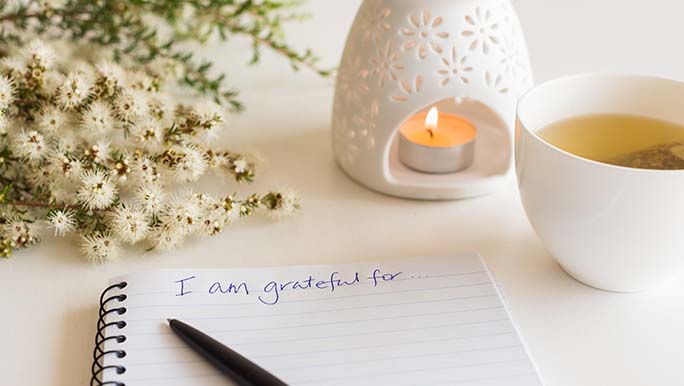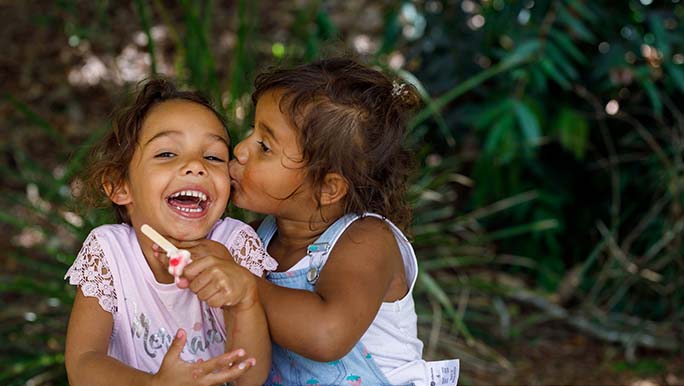Why you need gratitude affirmations in your life

Key points about gratitude affirmations
- Studies have linked gratitude with better physical health and improved life satisfaction
- Gratitude affirmations serve as a reminder of what you're most thankful for in your life
- Gratitude affirmations can be done at any time, but morning and night may work well
- A family gratitude practice at dinner can help foster gratitude in children
Gratitude affirmations and practices may have positive effects on our lives, according to Psychologist Dr Bronwyn Coward. But you need to go beyond saying "please" and "thank you" and take the time to inwardly reflect on what you're really grateful for if you want to see the real benefits of gratitude affirmations.
There’s some evidence in the literature to show that the practice of gratitude does have positive effects.
“Practicing gratitude and reflecting on things that you're grateful for can really help to quiet or shift underlying negative self-talk,” Dr Bronwyn says.
“It can also help you to reflect on particular events or memories, and form stronger positive associations around those.”
And gratitude practice is nothing new: many acts of prayer, saying grace or giving thanks are – at heart – forms of gratitude.
So, before you dismiss ‘being grateful’ as one of those modern, new-age, hippy things, remember that gratitude has been around for centuries.

Gratitude practice is nothing new: these types of practices are part of several cultures and religions.
Gratitude affirmations: what science says about the benefits of practising gratitude
According to Dr Bronwyn, research shows that gratitude may be good for you.
“There’s some evidence in the literature to show that the practice of gratitude does have positive effects,” she explains. “The effect isn’t necessarily as great as that seen with other psychological interventions, but the research shows that it can add to positive wellbeing.”
So what, exactly, does the research say? Here are just a few examples:
- In one study, researchers found a link between gratitude and better physical health.
- Another study found that undergraduate students with higher levels of gratitude had better social support, which was both directly and indirectly linked to their wellbeing.
- A further study found a connection between the practice of gratitude and higher levels of self-reported life satisfaction and self-esteem.
Scientific mic drop.
What are gratitude affirmations?
Gratitude affirmations are a simple way to practise gratitude during your day. They serve as a reminder of the things you’re most thankful for in your life. They may encourage positive thinking, and may even help you cope with difficult situations in your life, such as dealing with job loss or moving house.
Generally, gratitude affirmations start with a statement, such as “I’m thankful for…” or “I appreciate…” You then follow this with something meaningful that you’re grateful to have in your life.
Your gratitude affirmations might be about your level of happiness in life, your resilience, your productivity at work or even your ability to feed your family healthy, sustainable food choices.
You can say your gratitude affirmations in the morning when you wake up, in the evening before you go to bed, or at whatever time works for you.
Incorporating other gratitude practices into your routine

There’s some evidence in the literature to show that the practice of gratitude does have positive effects.
Of course, knowing that something’s good for you and actually doing that thing are two very different situations.
The good news is that a gratitude practice can be very simple. The most important thing, according to Dr Bronwyn, is being consistent.
Here are her top three ideas for incorporating a simple gratitude practice into your routine:
- Write a gratitude journal
Whether you keep a daily gratitude journal or a weekly one, writing in it involves taking the time to think about everything you’re grateful for.
- Start a gratitude jar
This activity is something you can add to over time. Each time you’re grateful for something, write it on a piece of paper and add it to the jar. Then, a few months down the track, you can open the jar and reflect on all those moments of gratitude.
- Introduce a gratefulness board at work
Gratitude is also something that can work for team building. Team members can add comments on the board about what they appreciate in other members. This can then serve to bring people in the team together.
Fostering gratitude in kids
Teaching your kids manners is one thing, but how can we teach them to truly feel grateful for the good things in their lives?
Conscious Parenting Coach and Emotional Intelligence Trainer Anna Davis shares some creative ways to foster gratitude in kids (instead of just the usual advice to buy gratitude journals for kids).
But first, let’s explore the benefits of gratitude practices for kids.
Recently, researchers reviewed the scientific literature on gratitude. The results of their review suggest that gratitude may have positive benefits for adults on their wellbeing, happiness and life satisfaction.
However, very little research has been done on the benefits of practising gratitude for kids. Nevertheless, the initial research suggests:
- there may be a link between gratitude and happiness in children by the age of five
- kids who have a better early understanding of emotions and mental states at ages three and four may understand more about gratitude by age five
- gratitude positively impacts preschool children’s sharing and helping behaviours
- when parents actively fostered gratitude with their kids (ages 6-9) daily, their children demonstrated gratitude more often
- teenagers (ages 14-19) with higher levels of gratitude also scored highly for positivity and life satisfaction measures
- older children and teenagers (ages 10-14) who feel more gratitude are more likely to help others and society as a whole for the greater good
- grateful teenagers (ages 14-19) tended to have better results in school and scored more highly on life satisfaction than those who were less grateful
Creative gratitude activities for kids
As a parenting coach, Anna recommends starting a family gratitude ritual while having dinner.
“It’s a great time because you’re all already sitting together and it won’t feel like you’re making your kids do another one of your mindfulness activities,” she says with a laugh.
To participate, each family member should answer these four questions:
- What was the best part of your day?
- What was the worst part of your day?
- What was a moment you were compassionate to yourself, someone else, a plant or an animal?
- What mistakes did you make today?
Anna says these questions are designed to help get children to talk about all of their day and appreciate the wonderful things while accepting the unpleasant things that happen in their lives.
“The best way to teach children gratitude is to stop protecting them from the upsetting, unhappy, uncomfortable or painful experiences they have throughout their days. Start talking about the “good” and “bad” experiences they have,” she explains.
As a result, Anna says children may start to feel, understand, accept and process the difference between these experiences.
They may also develop an intrinsic understanding of gratitude rather than inauthentic forced gratitude.
You have to start somewhere
If you’re struggling to start your gratitude practice, Dr Bronwyn suggests trying a tool that’s often used in mindfulness: tapping into your five senses.
She recommends asking yourself, “What’s something I can hear that I’m grateful for? What’s something I can feel? Taste? Smell? Touch?”
Use your five senses as a guide and start there.
So… what are you grateful for today?
Related:
- Can you colour your way to a more mindful life?
- Want to play self-care bingo?
- How to create habits you can actually stick to (for good this time)
Dr Bronwyn Coward is a registered Psychologist, an endorsed Clinical Neuropsychologist and an AHPRA board-approved supervisor who draws on over a decade of experience to bring solution-based assessments to her clients.
Anna Davis is a Conscious Parenting Coach and EQ Trainer who arms parents with the tools they need to cultivate deeper connection, lower stress levels and create calm in their households.
Reviewed by the healthylife Advisory Board July 2021.


